Bartender Salary in the United States
Average Bartender Salary by Year in the US
According to the Bureau of Labor and Statistics, the average Bartender salary can range from $19,870 to $61,210 per year — averaging $37,090 plus tips per year. This makes a substantial 32% Bartender salary increase compared to $28,000 per year in 2019.
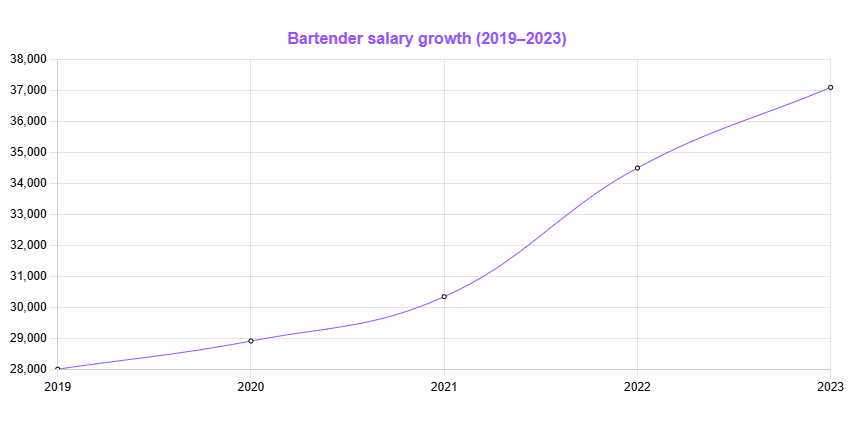
[Source: BLS]
The graph below shows the different Bartender salary levels based on the most recent BLS data, breaking down how much you can earn from the lowest to the highest average annual pay.
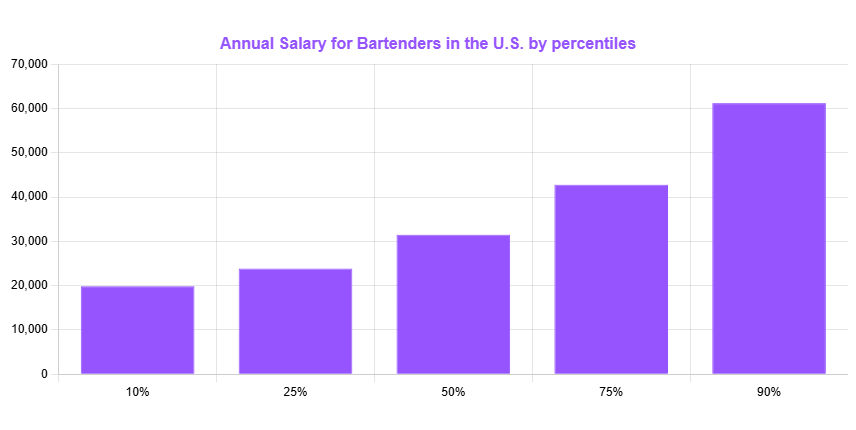
[Source: BLS]
If you’re in the 90th percentile, you earn more than 90% of all the Bartenders in the U.S. Earning $ 61,210 then puts you in the top 10% of earners among Bartenders.
Meanwhile, if you’re in the 10th percentile, you earn less than 90% of the group. Earning $19,870 then places you in the bottom 10% of earners among Bartenders.
How Much Do Bartenders Make per Month?
Bartenders can earn an average of $3,091 per month. You can boost your earnings with more tips, which greatly depends on your relationship with customers and how busy your shifts.
How Much Do Bartenders Make an Hour?
The average Bartender hourly wage is $17.83, which is a high increase from the 2019 average of $13.46. This ranges from $9.55 per hour on average for the lowest-paid Bartenders to $29.43 per hour for the highest-paid ones.
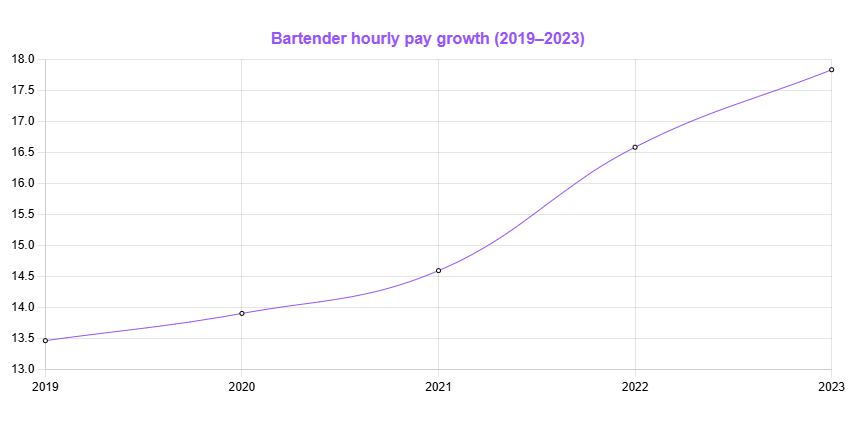
[Source: BLS]
Minimum wage for Bartenders
The federal minimum wage for tipped employees, including Bartenders, is $7.25 per hour combined with tips. This can differ depending on your state or city, where local laws might set higher minimum wages or tipping standards.
However, keep in mind that Bartenders often earn higher wages than minimum wage. To know the minimum wage in your location, check out our labor laws for all U.S. states.
Bartender Salary by State or District
Bartender salaries can vary depending on the state or district you reside in. The District of Columbia, Washington and New York offer the highest average salary for Bartenders, with $59,850, $57,710 and $56,140 per year, respectively.
Check out the video below for the 10 highest-paying states with their respective employment statistics.
States with high demand for Bartenders, such as tourist destinations, tend to offer higher salaries and more tips. Those with a high cost of living also tend to offer higher wages to compensate for the higher cost of living.
Check the average Bartender salaries for each state below. Feel free to rearrange the table alphabetically or from highest salary to lowest.
[Source: BLS]
High-Paying Cities for Bartenders
New York City offers one of the highest Bartender salaries at $58,050 per year or $27.91 per hour. Los Angeles also offers a high salary of $40,080 per year or $19.21 per hour.
Other top-paying cities for Bartenders include Miami and Chicago. Keep in mind that cities with high demand for bartenders, such as tourist destinations, tend to offer higher salaries and more tips.
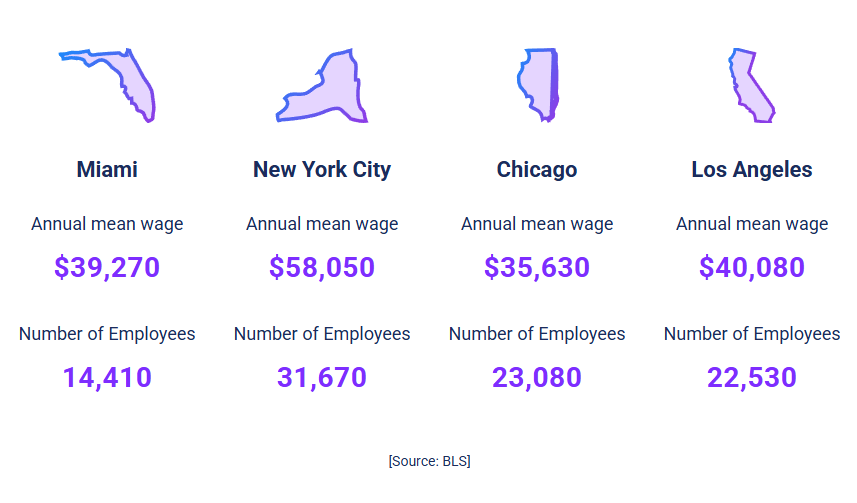
Factors That Influence Bartender Salaries
Aside from geographic location, as seen above, the following factors also influence the average salary of Bartenders.
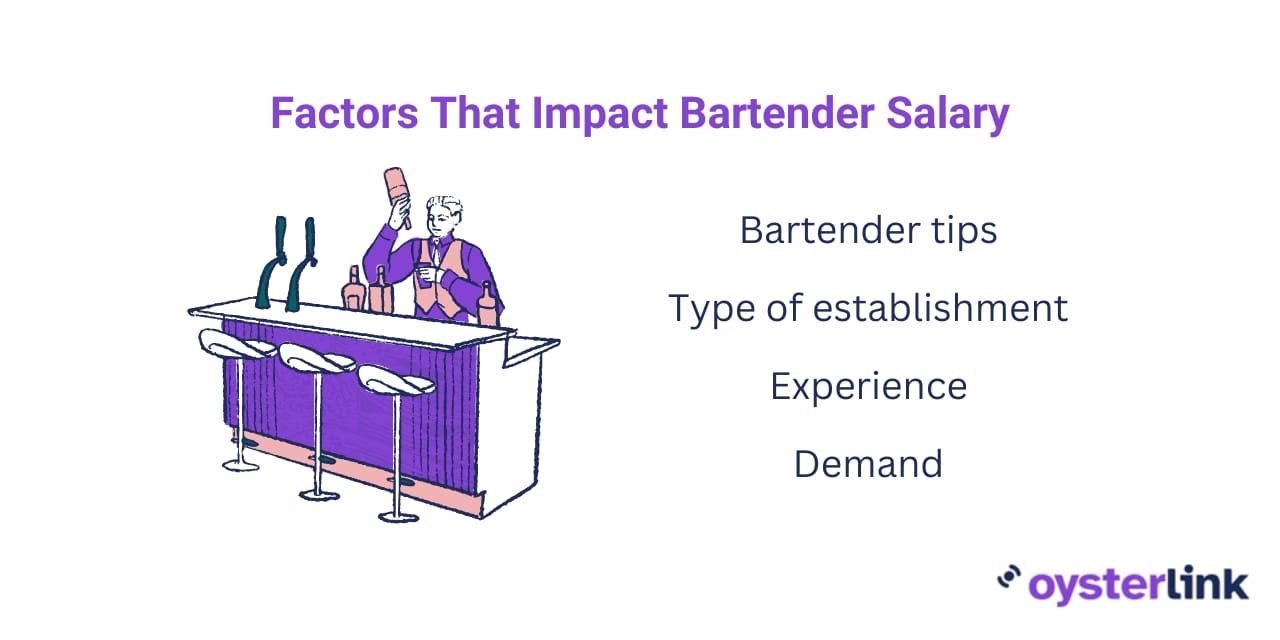
Bartender tips
Tips form a significant part of a Bartender’s overall earnings. Bartenders working in establishments with a high volume of customers or those with a generous tipping culture may earn more in tips than those in quieter venues.
Typically, customers tip between 15% and 20% of the total bill. An alternative approach is tipping per drink, with a standard of $1 for simple drinks like beer and $2–$4 for mixed drinks or cocktails.
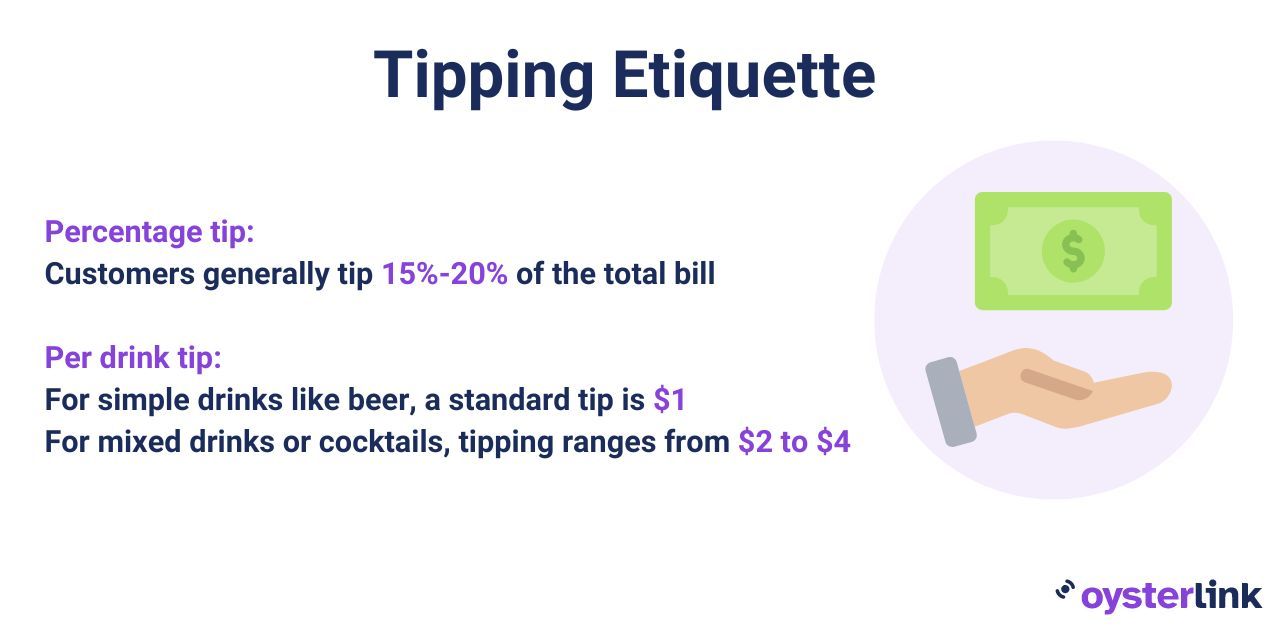
For example, if the bill is $50, a 20% tip would be $10 (simply multiply $50 by 0.20). Bartender salary with tips can add up quickly, especially on busy nights and peak hours.
Type of establishment
The type of establishment where a Bartender works can also impact their salary. Bartenders in upscale restaurants, high-end hotels or exclusive clubs may earn higher wages than those in neighborhood bars or casual dining establishments.
Experience
Bartenders with more experience and a proven track record of excellent customer service and mixology skills may command higher salaries than entry-level Bartenders.
Check out our article on how to be a good Bartender for tips on how to build your experience and skills fast. You can also review our Bartender job description to know what to expect in this line of work.
Whether you’re an entry-level Bartender, an Experienced Bartender or a Hotel Bartender, you can use our Bartender resume templates. Feel free to copy and customize them for your job search.
Demand for Bartenders
The demand for Bartenders in a particular industry can also influence their salaries. For example, performing arts companies often host events, shows and performances where Bartenders are needed to provide beverage services to patrons.
These venues may include theaters, concert halls and entertainment venues where Bartenders play a crucial role in enhancing the overall guest experience.
Due to the specialized nature of their service, performing arts companies may offer higher wages to attract and retain talented individuals. Below is a complete list of top-paying industries for Bartenders, according to BLS.
[Source: BLS]
How To Get More Tips, According to Successful Bartenders
As mentioned, tips often help Bartenders maximize their earnings. That's why we've gathered some of the best advice from hospitality professionals who have worked or are working as Bartenders.
"The most important thing in increasing your tips is having an open mind to learning constantly. Start asking questions, get more knowledgeable and the opportunities will present themselves.
Another great way to get more tips is upselling. This one might be challenging when you are starting out, but there is a simple way to deal with the lack of knowledge. Be transparent with the customer, tell them — 'I am not sure but let me check that for you.'
The happier your customers are the more often they will return, and this will lead to a higher amount of money in your pocket. The guests want to know that they are being cared for."
"Here are effective tactics I use to maximize tips and enhance earning potential:
- Personalized Service: Remembering regular customers' names and drink preferences creates a personalized experience that can lead to higher tips.
- Engagement: Being friendly, approachable and engaging with customers helps build rapport and makes the bar experience enjoyable.
- Presentation: Presenting drinks attractively, with attention to garnishing and glassware adds value to the service.
- Upselling: Suggesting premium spirits, specialty cocktails or add-ons can increase the total bill, often resulting in a higher tip percentage.
- Speed and Efficiency: Serving drinks quickly and efficiently ensures customer satisfaction and keeps the flow of orders smooth, encouraging more frequent tipping."
Editor’s note: The interview excerpts above have been edited for brevity and clarity.
Bartender Compensation Package
In addition to base salary and tips, you may receive other job benefits and perks in your compensation package as a Bartender.
These can include benefits such as health insurance, 401(k)/retirement plans, paid time off and employee discounts. Some employers may also offer you bonuses or incentives based on performance, like meeting sales targets or receiving positive customer feedback.
Additionally, Bartenders may have access to career growth opportunities, such as training programs or certifications, to enhance their skills and advance their careers within the industry.
How Much Do Similar Careers to Bartenders Get Paid?
